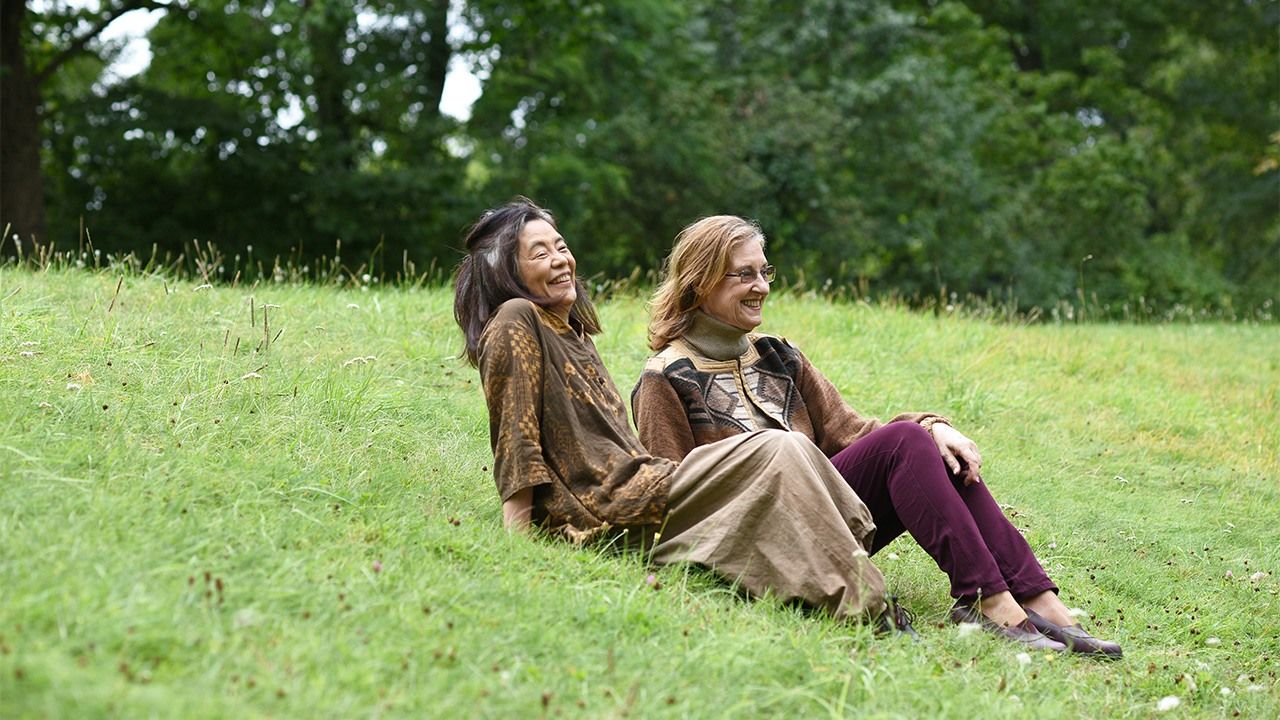
The Limitless Possibilities of a Literature Beyond Borders: A Conversation with Tawada Yōko
Making the Most of the Pandemic
IRMELA HIJIYA-KIRSCHNEREIT You’re known as an author who travels a lot. I understand you have given nearly 1,200 public readings of your work in various countries around the world, for example. That’s on top of lectures and symposiums. The pandemic must have made a huge difference to your life.
TAWADA YŌKO The travel was something that sort of crept up on me. And I just kept on traveling, thinking maybe that’s how the world was going to be for me. Unfortunately, though, I ended up traveling too much. People in the places I visited would recommend things to read and I’d buy the books but never had any time to read them. And then it would be time to leave for the next trip. I’d even started to think regretfully that maybe it was meaningless to travel so much.
Then the pandemic hit. Suddenly traveling became impossible, and I had time for all the books I’d been meaning to read. And I wasn’t the only one. In Japan, sales of books increased for the first time in decades. People were stuck at home, and rather than just spend their time looking at things online, a lot of them felt like reading as well.
HIJIYA-KIRSCHNEREIT Let’s hope that continues to be the case after the pandemic is over.
TAWADA It’s the first time we’ve experienced anything like this. On a personal level, I made good progress with my writing and managed to get a lot of reading done too. Confronted by a crisis like this, I think human beings respond by feeling an urge to do something. But since the beginning of this year, my life is already starting to return to its previous pattern, even though the situation isn’t really much better than it was in 2020. More and more events are taking place online. I sometimes feel that literature requires a kind of isolation. You have to shut yourself away, either in a monastery or in a prison, to get anything written. Part of me feels that I’ve not really been using the pandemic effectively anymore since the start of the year.
Losing Touch with the “Mother Tongue”
HIJIYA-KIRSCHNEREIT You decided to move to Germany and start your career as a writer here—not because you were forced into exile or anything like that, but out of a spirit of adventure, a determination to see the world. And you didn’t just come as a tourist. You worked in Germany, you studied at Hamburg University, you wrote your PhD dissertation in German. You began your career as a writer in Germany, and have been active internationally ever since.
TAWADA I traveled on the Trans-Siberian when I was a student, and spent time bumming around India. And those trips felt like adventures at the time. But in fact, the real adventures came later. Going out in a foreign city, renting an apartment, working in a company, living day-to-day life in the language of a foreign country—that was the real adventure. In Hamburg, I worked in an office every day, initially as a trainee. Making friends, talking to colleagues, getting invited to birthday parties . . . it was all hard work, but I learned a lot from it.
Probably it would be melodramatic to say that my sense of self collapsed, but I did experience a feeling that my identity was starting to fall apart, squeezed between two languages. Until I came to Germany, I spoke only Japanese, and then suddenly I was using only German. In those days there was no internet, and it wasn’t easy to make international phone calls. I didn’t know a single Japanese person. So Japanese just sort of disappeared from my life, and I was left with just German. What had happened to the person I had thought of as myself until now? All of this, you could say, was a kind of unexpected adventure.
Translation as an Act of Creation
HIJIYA-KIRSCHNEREIT As a bilingual author, you publish in both German and Japanese. How do you decide which language to write in?
TAWADA If I use German to write about my memories of my childhood in Japan, I find a kind of fictionality comes into what I write, almost as if I’m talking about an imaginary country. And vice versa, if I write in Japanese about things I’ve experienced in Germany, the process somehow seems to help me digest my life and translate into something I can offer to readers. So I decide on a case-by-case basis, I suppose, depending on the subject matter.
HIJIYA-KIRSCHNEREIT You don’t often translate your own works, although you did translate Yuki no renshūsei [trans. by Susan Bernofsky as Memoirs of a Polar Bear] into German, as Etüden im Schnee.
TAWADA Whenever I try translating something I’ve written in German, I always find myself thinking: “I would never have written it like this in Japanese.” I start wanting to change things. Introducing different characters, altering details of the story. . . . It gradually drifts away from the original text. Translating your own writing doesn’t really work.
HIJIYA-KIRSCHNEREIT Do you feel dissatisfied when you read other people’s translations of your work?
TAWADA Not at all. Translation is an act of creation in its own right. When I read my novel Kentōshi in German [translated by Peter Poertner as Sendbo-o-te], I felt the narrator’s voice was different from my voice, but that doesn’t matter. What’s important is that that text should have some kind of voice. If the translator had tried too hard to imitate my voice and had produced a kind of jumbled mess of a novel with no distinctive voice of its own—that would have been no good at all. I quite enjoy reading translations of my books, actually.
Learning from the Rhythms of a Medieval Classic
HIJIYA-KIRSCHNEREIT You’ve published two volumes of what will eventually be a trilogy of novels. The first part, Chikyū ni chiribamerarete [Encrusted in the Earth], appeared in 2018, and that was followed by Hoshi ni honomekasarete [Written in the Stars] in 2020. The main character in the novels is a woman called Hiruko. That’s also the name of the first child born to the gods Izanagi and Izanami in the creation myths in the Kojiki. Is there a connection?
TAWADA Yes, I took the name from the Kojiki. When I was in elementary school a lot of our teachers were liberals. They tended to regard the Japanese myths as nationalistic and steered us away from reading them. I wasn’t interested in that kind of thing until much later, anyway. As a student I mostly read Dostoevsky and other Russian literature.
It was after I came to Germany that I started to realize how many stories from all over the Pacific region relate to these ancient myths. Similar kinds of myths exist in South America and in Southeast Asia. And the Kojiki is just another example of that. Once I understood that, far from being nationalistic, these myths were actually profoundly international in the true sense of the word, I came to feel a sense of closeness to them.
HIJIYA-KIRSCHNEREIT Apart from Kojiki, are there any other works of Japanese literature that appeal to you?
TAWADA I like medieval literature. Of course, I’m not an expert in the field—I just enjoy reading it. Whenever I have time, I like to read things like Shasekishū [trans. Sand and Pebbles], the famous collection of Buddhist parables, and Hōjōki [trans. An Account of My Hut]. I also like Konjaku monogatari [trans. Tales of Times Now Past]. It’s instructive to see how these stories and fables were transmitted from India and China and the forms they took in the different cultural soil of Japan.
When I was in high school, I used to like the Tale of Genji. The Tale of the Heike was less to my taste back then—I dismissed it as just a long war story about samurai warriors. But that changed once I started to give reading performances in Germany. The Heike has a wonderful rhythm that comes across when you read it out loud in Japanese. Of course, it was originally written to be recited by performers on the biwa lute. When I was looking for Japanese texts that I could use as a reference when reading to a piano accompaniment, I discovered these wonderful rhythms and cadences in the spoken language of the narrative.
Changing Gender Boundaries
HIJIYA-KIRSCHNEREIT In 2018, I published “Joryū” hōdan, a collection of interviews I conducted in 1982 with women writers like Enchi Fumiko and Ishimure Michiko. One of the main subjects I wanted to discuss was how these women felt about the male-dominated society that still prevailed in Japan. Before doing the interviews, I had expected these writers to express feelings of anger and resentment toward men. They were all women with forceful personalities, and the women’s liberation movement had just entered Japan from the United States and was quite influential. But in fact, all the writers I spoke to were quite forgiving. “Men are under pressure from society,” they said: “They have to swagger and act big. It’s not really their fault.” As a German woman I was quite surprised. What are your thoughts on the subject of gender in Japan?
TAWADA When my first books were published in the 1990s, that strong polarity between men and women was starting to break down. There were the beginnings of a move toward recognizing multiple genders, and differences within genders. Lesbians and heterosexuals within the category of “women,” for example. Issues to do with transgender people and bisexuality started to become more prominent, and the hard-and-fast borders between genders started to disappear. The same thing is true of international borders, I think. The strict dividing line between human beings and other species also started to fade. We’ve seen the rise of movements advocating for animal rights, and so on. One question we face now—and this goes beyond gender—is how to overcome the various divisions that have appeared since the start of the twenty-first century. That’s one of the main subjects of my writing.
Hope for the Future?
HIJIYA-KIRSCHNEREIT Reading the trilogy, I was struck by the way in which the narrative elements in your writing have increased. Your subject matter has changed too: your recent books are dystopias rather than utopias, and deal with events that could fairly be described as catastrophic. You introduce your readers to old and young characters, but the old person is fit and healthy while the child is feeble and lacking in energy. It’s a kind of topsy-turvy, upside-down world. Are you optimistic or pessimistic about the future?
TAWADA When I try to depict the near future, what I write gets quite bleak. But that doesn’t mean I think everything is hopeless and the future will necessarily be catastrophic. After all, things were much worse in the past. It’s true that we face all kinds of problems today, but the world is still in a better place than it was during World War II, for example. We’ve made progress in a lot of ways, so in that sense I’m not pessimistic.
HIJIYA-KIRSCHNEREIT So you don’t feel any sense of hopelessness?
TAWADA Not at all.
HIJIYA-KIRSCHNEREIT Human history is really an extremely short part of the history of the planet. Some philosophers and natural scientists believe that we may be approaching the end of human history—that human beings are destroying the world at a terrible rate, and we are getting close to a stage where it will be impossible to reverse the process. They think that humanity might soon become extinct. But that might not be such a bad thing—from the perspective of the Earth, at least.
TAWADA It’s a difficult question. If you take the view that all living things—me, the frog, the flower in bloom over there—are all part of life on earth, then it doesn’t really matter if the human era ends. I think that’s a way of looking at the world that has deep roots in Japanese literature.
HIJIYA-KIRSCHNEREIT I feel that strongly too. It’s a way of thinking that can be a kind of consolation, or salvation.
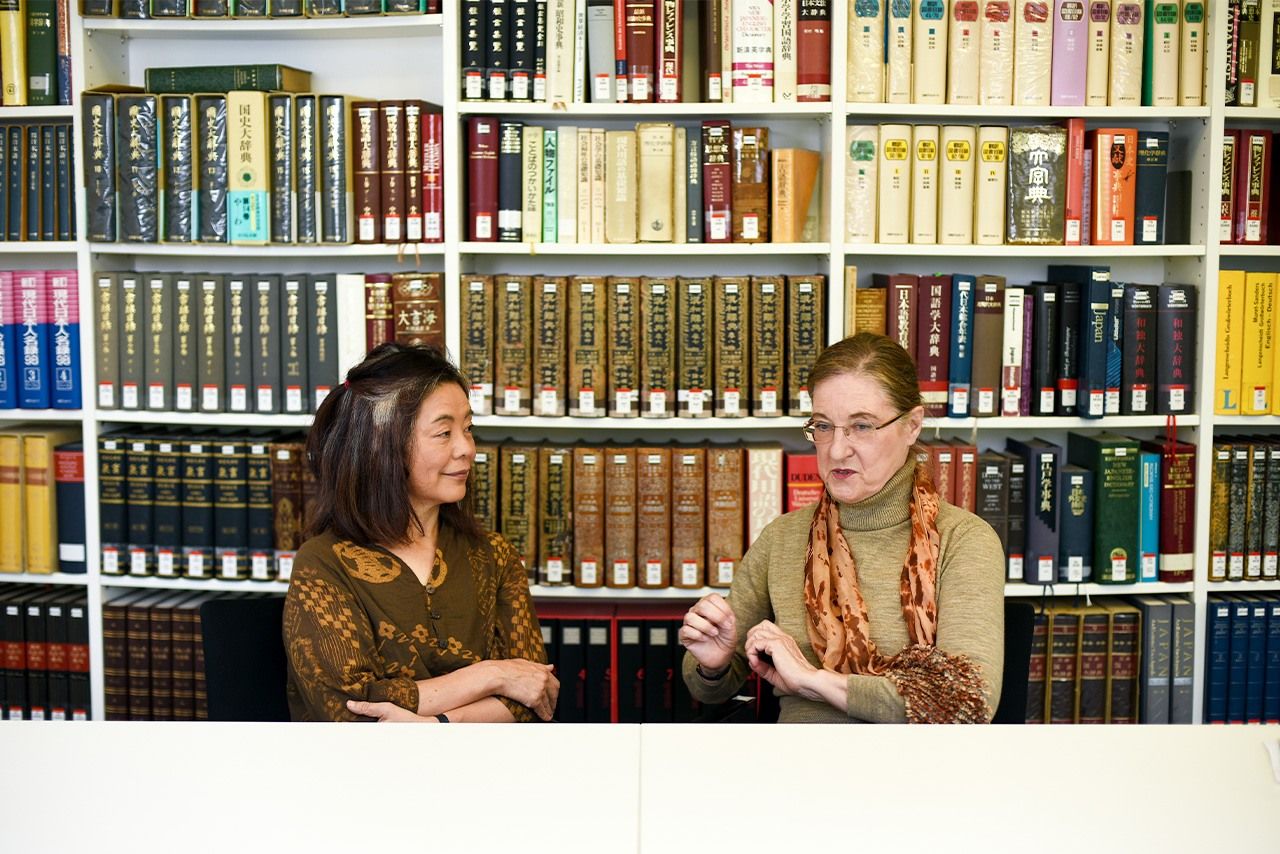
Tawada Yōko in conversation with Irmela Hijiya-Kirschnereit at the Freie Universität Berlin.
(Originally written in Japanese. Banner photo: Tawada Yōko and Irmela Hijiya-Kirschnereit on the campus of the Freie Universität Berlin. Interview was compiled by Kondō Hisashi. All photographs by Sawabe Katsuhito.)
NIPPON
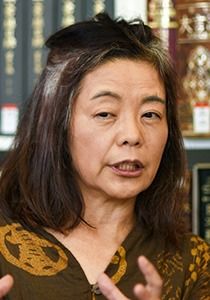
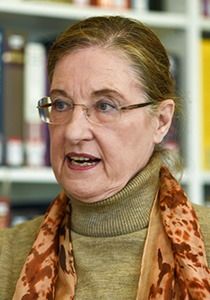
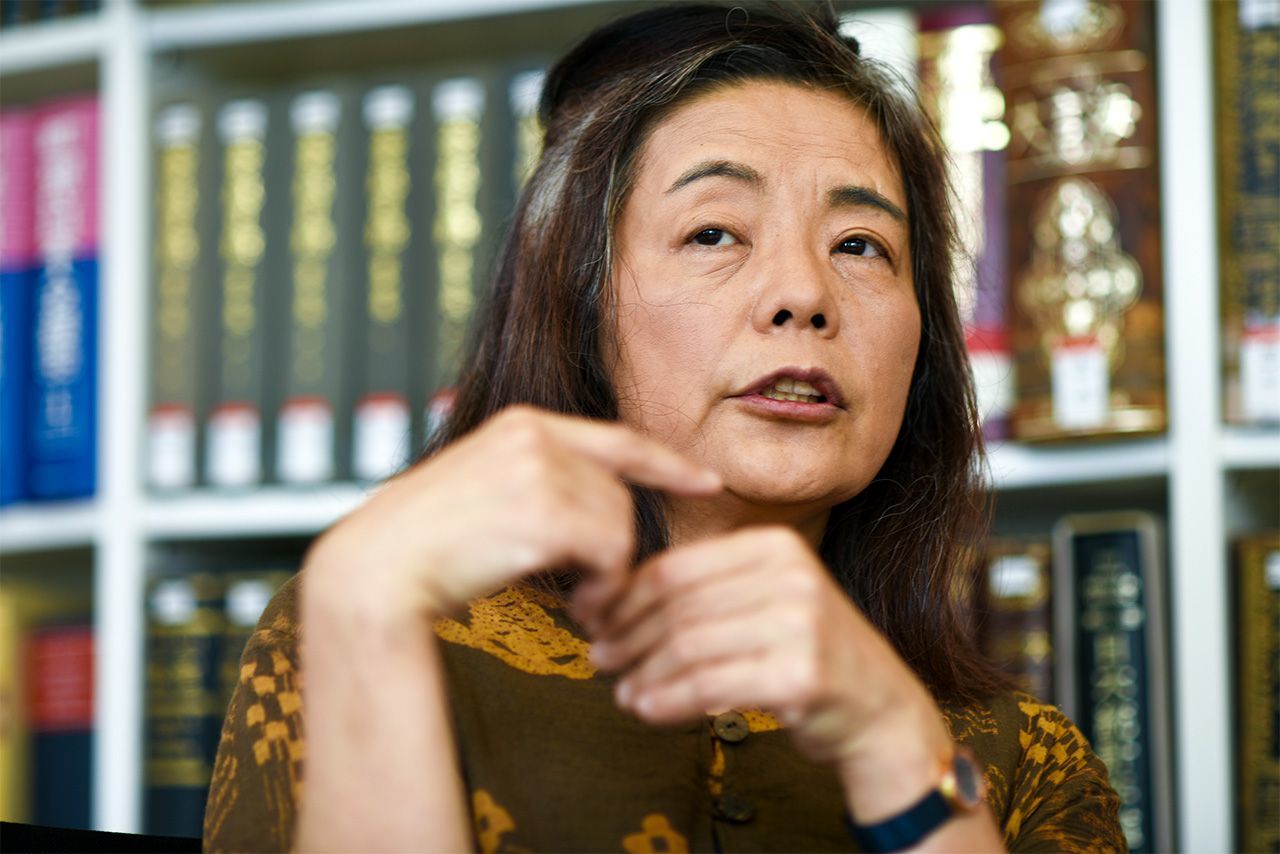
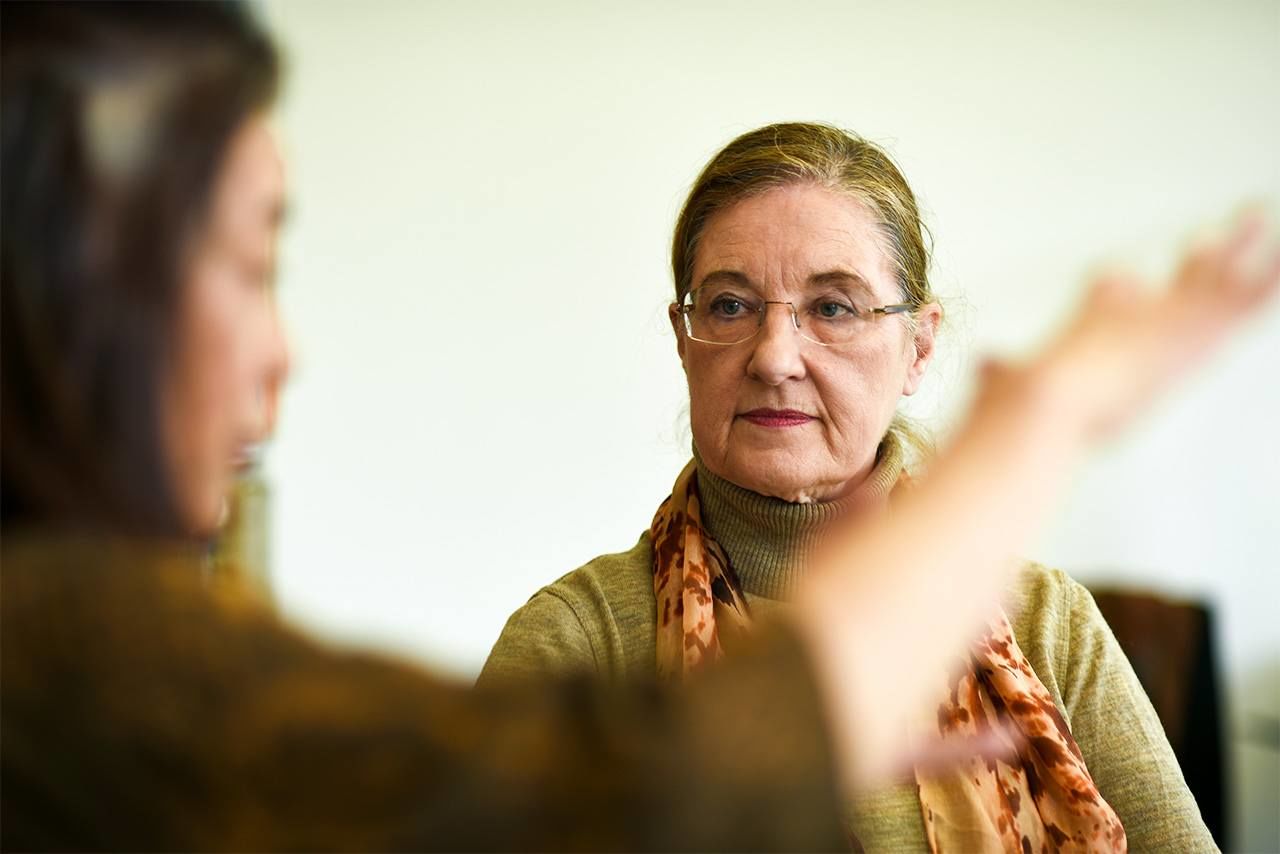

No comments:
Post a Comment